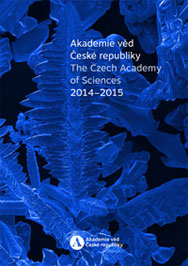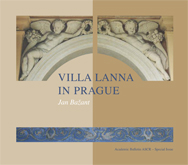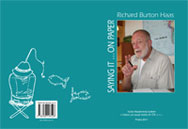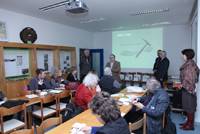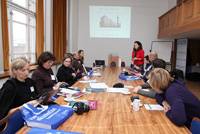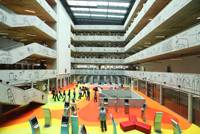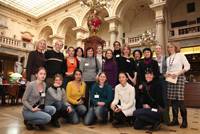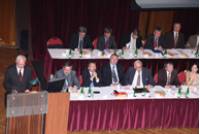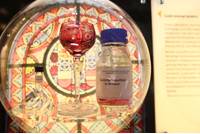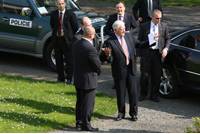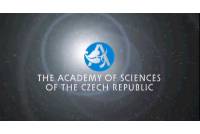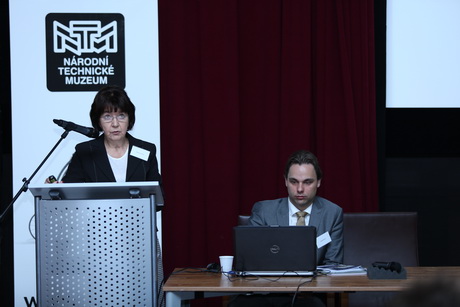
Photo: Stanislava Kyselová, Academy bulletin
Halina Lichocka, Polish Academy of Sciences and Rudolf Kučera, Masaryk Institute and
Archive of the CAS
The Cracow Scientific Society was founded at a time when Cracow, after having been detached
from the remaining Polish territories, which had been caused by wars going on in Europe, obtained
the status of a Free City. The autonomy that it was enjoying at the time created opportunities for
implementation of certain reforms, initiated at the times of the Commission for National Education
(1773-1794), the first ministry for public education in Europe. The establishment of a scientific
society in Cracow was among the reforms initiated in that period, many of which had been never
finished.
On July 24, 1815, the Rectors` Council of the Jagiellonian University in the Free City of
Cracow decided on the establishment of the Cracow Scientific Society. The first public session of
the Society was held in February 1816; since then, the Society was active almost without
interruption although it happened in 1846 that Cracow lost its political independence and was
incorporated into Austria.
Josef Jireček knew the Cracow Scientific Society very well because he had been its member for
several years. After having received the Emperor`s rescript, he took action immediately. The task
was not an easy one as the Academy had to be an institution of a different nature. In
particular, the number of its members had to be considerably reduced, which meant that the whole
was a rather delicate matter.
Josef Jireček`s first move was to write a letter to the Society`s President Joseph Majer and
to invite him for talks to Vienna. To start with, the draft Statute had to be produced and later
given the Emperor for approval.
The preparatory works were proceeding quickly despite the fact that in November 1871,
Minister Jireček, who had had a very positive attitude towards the undertaking, handed in his
resignation together with the whole government. The role of the negotiator with the Cracow
Scientific Society fell therefore to his successor Karol Stremayer who was also charged with
completing the Society`s transformation.
The Statute of the newly founded Academy of Arts and Sciences was approved by a decision of
the Emperor Franz Joseph I, reached on February 16, 1872. The Emperor nominated his brother
Archduke Karl Ludwig as the Academy`s Protector and the function of the Deputy Protector fell to
Alfred Potocki, the former Prime Minister of the government in Vienna.
The Academy was assigned to deal with research issues relating to different fields of science:
philologies (mainly the Polish and the Slavic ones), the history of literature, the history of art,
philosophical, political and legal sciences, history and archaeology, mathematical, life, Earth and
medical sciences. In order to make it possible for the Academy to deal with so many research
topics, it was divided into three divisions: a philological division, an historical-philosophical
division, a division for mathematics and natural sciences. Each division was allowed to establish
its own commissions dealing with different branches of science.
The Statute made it obligatory for the Academy to hold plenary and divisions` sessions as well
as to organize meetings of the respective commissions. The most important of them were the annual
plenary public sessions. According to the respective provision of the Statute, such session was to
be held each time « on May 3, the anniversary of the Academy`s establishment ».
It would be difficult to say what deserved more admiration in this regard – either the
diplomatic skills of Alfred Potocki or the political insight of Franz Joseph I. The point is that
the date of May 3 was not a neutral one. It commemorated the adoption of the
Government Act, later called
The Constitution of May 3, 1791, by the
Great Sejm (parliament) in Warsaw. It was the second in the world (after that of the United
States of America) and first ever written constitution in Europe that laid down the legal system of
a state. On the first anniversary of this day, the date of May 3 was announced a public holiday in
Poland. Because of a Russian military intervention that ensued, the Constitution of May
3, 1791 was in force only for a little longer that one year. The holiday was abolished and in the
period of Poland`s captivity, it was prohibited.
The first members of the Academy were chosen from among the members of the Cracow Scientific
Society. It was a 12-person group including only the local members, approved by the Emperor
who also elected the first President of the Academy (Józef Majer) and its Secretary General (Józef
Szujski) from this group.
By the end of 1872, the organization of the Academy of Arts and Sciences in Cracow was
completed. It had its administration, management and three divisions that were led by their
directors and secretaries. It also had three commissions, taken over from the Cracow Scientific
Society, namely: the Physiographic Commission, the Bibliographic Commission and the Linguistic
Commission. At that time, the Academy had only 24 active members in total who had the right to
elect non-resident and foreign members. Each election had to be approved by the Emperor.
In February 1873, the Academy of Arts and Sciences was functioning so smoothly that it could
actively participate in the celebrations of the 400th birth anniversary of Mikołaj
Kopernik. What came too late was its first public plenary session. According to the Statute, it
should have been held on May 3, 1873. However, this planning was impaired by the Vienna
Exhibition held at exactly the same time. Its President was the Academy`s Protector Archduke
Karl Ludwig. It was for this reason that the inaugural session of the Academy was held only on
May7. The introduction speech was made in German by Karl Ludwig and courteously answered – in
German as well – by President Józef Majer. The further proceedings were held in Polish, as in line
with the Statute. After the speeches had been delivered, a list of candidates for the Academy`s new
members was read out. There were five persons on this list, three of which were Czech: Josef
Jireček, František Palacký and Karl Rokitansky. They were all former members of the Cracow
Scientific Society, already nonexistent at the time. They were approved by the Emperor Franz Joseph
in his rescript of July 7, 1873.
Josef Jireček (1825-1888) became a member of the Philological Division. He was an expert on
the Czech literature, an ethnographer and an historian. Apart from being a scientist, he was
also active in politics as the Minister of Education, a Member of Parliament and a Member of the
Council of State.
František Palacký (1798-1876) became a member of the Historical-Philosophical Division of the
Academy of Arts and Sciences in Cracow. As an historian and a politician, he was one of the main
contributors to the Czech rebirth in the XIX
th century. His most important work is
The History of the Czech Nation in Bohemia and Moravia, published in Czech and in
German.
The third person from this group – Karl Rokitansky (1804-1878)- became a member of the
Division for Mathematics and Natural Sciences. He was one of the most noted experts on anatomy and
pathology, a professor of the university of Vienna. In 1848, he became the Honorary Rector of the
University in Prague.
The mere fact that the first foreigners had been elected as members of the Academy was a
perfect example of the criteria according to which the Academy selected its active members. From
among the humanists, it accepted those researchers whose research had been linked to Polish matters
and issues. As for members of the Division for Mathematics and Natural Sciences, the Academy
invited scientists enjoying exceptional recognition in the world. These criteria were
binding throughout all the following years.
Until the end of World War I, the Czech representatives of social sciences were the biggest
group among the foreign members of the Academy. As for the foreign members, it were the Poles from
the territories annexed by Russia and Prussia as well as those living in exile in other countries
who made up the biggest group.
The Academy elected two other humanists as its members during the session held on October 31,
1877 and these were: Václav Svatopluk Štulc (1814-1887) and Antonin Randa (1834-1914). The
Emperor Franz Joseph approved of these two decisions only a year later in a document of November 9,
1878. This might have been caused by the political attitude of Štulc who had been against the House
of Habsburg.
Václav Svatopluk Štulc became a member of the Philological Division. He was a true Czech
patriot, a poet, a writer and a magazines` editor. In addition to this, he was a prelate in
Visegrád. The Polish milieu knew him well thanks to his former activities at the Cracow Scientific
Society where he had many close friends. He translated Polish literature into Czech,
i.a. books of Adam Mickiewicz.
Antonin Randa became a member of the Historical-Philosophical Division. He was an outstanding
expert on civil law. His works had a great impact on the Austrian legislation and – however
indirectly – on the Polish legislature, too, in particular on the law of the ownership and
compensation. He had received a doctorate
honoris causa from the University of Bologna and from the Jagiellonian University of
Cracow.
The next Czech scholar who became a member of the Academy of Arts and Scientists in Cracow was
Václav Vladivoj Tomek (1818-1905), an historian, an archivist, a politician and a teacher. It was
the Historical-Philosophical Division that elected him which happened on May 2, 1881. Six months
later, on November 14, this election was approved by the Emperor. The person who – already in the
years before - facilitated the contacts of Tomek with the Polish scientific milieu in Cracow was
František Palacký.
Tomek was a doctor of Philosophy and since 1882, a professor of history at the Czech
university in Prague. His most important works are the monumental
Chronicles of the City of Prague (12 volumes published between 1855 and 1901),
The History of the University of Prague and
The History of the Czech Kingdom.
On May 14, 1888, the Cracow Academy again elected a Czech scholar as its active member. This
time, it was a professor of Czech and Slovak philology at the university in Prague Jan Gebauer
(1838-1907), who was to replace Václav Štulc, who had died a few months earlier. The Emperor
approved the election on November 24, 1888. Gebauer was a specialist for the old-Czech language. He
had written a detailed (three volumes)
Historical Grammar of the Czech Language and
The Vocabulary of the Old Czech Language. In 1900, he received a doctorate
honoris causa from the Jagiellonian University in Cracow.
Further Czech members of the Cracow Academy were elected at the session on December 4, 1899.
This time, again humanists became new members: Zikmund Winter (1846-1912), Emil Ott (1845-1924) and
Jaroslav Goll (1846-1929). Their candidatures were accepted by the Emperor on May 17, 1900.
Zikmund Winter became a member of the Philosophical Division filling the position vacated
by the death of Josef Jireček. He was a writer, an historian and a secondary school teacher. As a
literary talented person, he was the author of short stories relating to the history of Bohemia.
His books:
The Historical Arabesques, published in 1888,
The Prague Images (1893),
The Old-Prague Short Stories from the XVI
th and XVII
th centuries were extremely popular. So were many others.
Emil Ott and Jaroslav Goll became members of the Historical-Philosophical Division. They
were professors of the Czech university in Prague as well as its rectors.
Emil Ott was a renowned expert on civil law and also an historian of law, enjoying recognition
both in Bohemia and abroad. He belonged to several international law societies and
organizations.
Jaroslav Goll, an historian, a poet, an essayist and an editor of Czech poetry, was also an
acclaimed scientist. He established his own school of historiography at the Czech university
in Prague that focused on analyzing the history of Bohemia as juxtaposed against the history of
Europe.
Two years later, on November 29, 1901, Jan Kvičala (1834-1908) and Jaromir Čelakovský
(1846-1914) were elected as members of the Cracow Academy. The Emperor accepted both candidatures
in the document dated May 13, 1902. Kvičala became a member of the Philosophical Division
and Čelakovský – a corresponding member of the Historical-Philosophical Division.
Jan Kvičala, a classical philologist, a teacher and a politician belonged to those employees
of the university in Prague who – after the university had been split into two parts, namely a
Czech one and a German one –remained at the Czech university. He was the first professor of
classical philology at this university. He initiated an editorial series in the framework of which
Czech translations of ancient literature were published. He himself was a translator and the
author of critical editions of texts written by Salustis and Herodot as well as of comments to
the works of Plato, Homer, Sophocles and many others.
Jaromir Čelakovský was a political activist, too. He had been educated in law but- as an
historian and archivist by the choice of heart - he worked as a professor of law at the Czech
university in Prague. He was also the Rector of this university. In addition to this, he was the
Director of the Royal Main Archives of the City of Prague and the President of the Historical
Society in Prague. In his research, he dealt mainly with the history of the Czech law.
The Emperor`s rescript approving the election of the next member of the Cracow Academy was
dated May 11, 1903.This time, it was František Vejdovský (1849-1939), a professor of zoology and
comparative anatomy of the Czech university in Prague. The Division for Mathematics and Natural
Sciences elected František Vejdovský during the session held on November 17, 1902. At that time,
the new member of the Cracow Academy was an already well-known author of publications on anatomy,
morphology and taxonomy. In the following years, he gained world recognition thanks to his
pioneering works on cytology and embryology. He was an appreciated scientist, held a honorary
doctorate from the University of Cambridge, and was a corresponding member of the Academy of
Natural Sciences in Philadelphia and Société de Biologie in Paris. He was also a
corresponding member of the Academy of Sciences in Zagreb, Société Zoologique in Paris,
Zoological Society in London and many others.
Another eminent Czech scientist who had enjoyed international recognition comparable to that
of František Vejdovský was chemist - Bohuslav Brauner (1855-1935), was elected by the same Division
for Mathematics and Natural Sciences of the Cracow Academy of Arts and Sciences at its session on
December 4, 1908, and became its member on May 21, 1909, pursuant to the respective document of the
Emperor. In his research, he paid a special attention to the chemical properties of the lanthanides
– he determined their atomic masses and placed them in the Mendeleev`s periodic table. He proved
that beryllium is a divalent element and anticipated the existence of promethium (a radioactive
chemical element that does not occur in nature).
Bohuslav Brauner held a honorary degree awarded by the Medical University in Manchester and
was an honorary member of the local Chemical Society, a corresponding member of the
Academy of Sciences in New York and a member of the International Commission of Atomic
Masses.
The last Czech scientists who had been elected as members of the Academy of Arts and Sciences
in Cracow before the end of the World War I were two humanists: Karel Kadlec (1865-1928) and
Václav Vondrák (1859-1925).
Karel Kadlec – a lawyer, an historian of law, a teacher and a writer was elected as a
corresponding member of the Historical-Philosophical Division during the session held on
December 10, 1910, which was confirmed on May 19, 1911. Kadlec, who also used the
pseudonym Bohdan Přehořovský, was a professor of the history of the Slovak legislation at the
Charles University in Prague. He was the co-author of the Czech constitution. The focus of his
scientific papers was the history of the Czech law as well as that of other Slovak countries. He
was a member of the Russian Archaeological Institute in Constantinople, the Serbian Academy of Arts
and Scientists in Belgrade and the Yugoslavian Academy of Arts and Sciences in Zagreb as well as
the Ukrainian Scientific Society in Kiev.
Václav Vondrák was a Czech Slavicist, a professor of the Slavic literature and languages at
the university in Vienna. He was elected a member of the Academy of Arts and Sciences in Cracow on
February 8, 1918, and as quickly as three months later (on May 17), this election was accepted.
Vondrák`s research focused on the comparative grammar of the Slavic languages, the Czech
language and the Old Church Slavonic language. He was the author of many publications and the
editor of the relics of Old-Slavic writing. His books were published in Czech and in German.
The founding of the Czech Royal Academy of Sciences in Prague in 1890 resulted in the
expansion of the cooperation of Czech and Polish scientists. The initiator of taking action in this
direction was Josef Hlàvka (1831-1908), the first President of the Czech Academy of Arts and
Sciences. He found a true ally in Stanisław Smolka, who had been the Secretary General of the
Cracow Academy in the years 1890-1903. First of all has been extended exchange of publications. All the members of the Czech Academy
regularly received issues of the „Bulletin“ and the „Reports“ of the Cracow Academy. Besides,
members of the Czech Academy had a privilege to receive for free on demand each publication they
needed from among those published by the Academy in Cracow.
Both Academies – the one in Cracow and the one in Prague – decided to organize a common
archaeological expedition to Egypt whose initiator was the Academy of Arts and Sciences in Cracow.
By that time, it had already had significant achievements in this field due to the excavation works
of Tadeusz Smoleński, carried out in the Upper Egypt and in the Libyan Desert. It was Jaromir
Čelakovský who joined the undertaking from the Czech side. A decision was reached to encourage the
interest of the Academy in Vienna for this project. As a result of this, the expedition to Egypt
set out in 1910. The scholars from Cracow, Prague and Vienna took part in it. It was one of the
most interesting Czech-Polish undertakings realized before World War I.
Prof. dr hab. Halina Lichocka
Polish Academy of Sciences
Institute for the History of Science
Warsaw, Poland
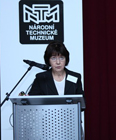 Lecture by professor Halina Lichocka, Polish Academy of Sciences, about the participation of Czech scientists in the activities of the Academy of Sciences in Krakow, presented on 28 May 2015 at the National Technical Museum in Prague.
Lecture by professor Halina Lichocka, Polish Academy of Sciences, about the participation of Czech scientists in the activities of the Academy of Sciences in Krakow, presented on 28 May 2015 at the National Technical Museum in Prague.
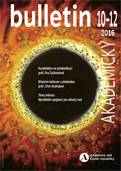

 Česky
Česky


